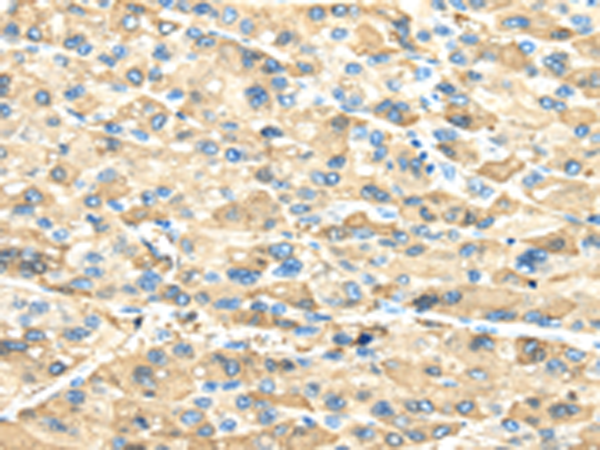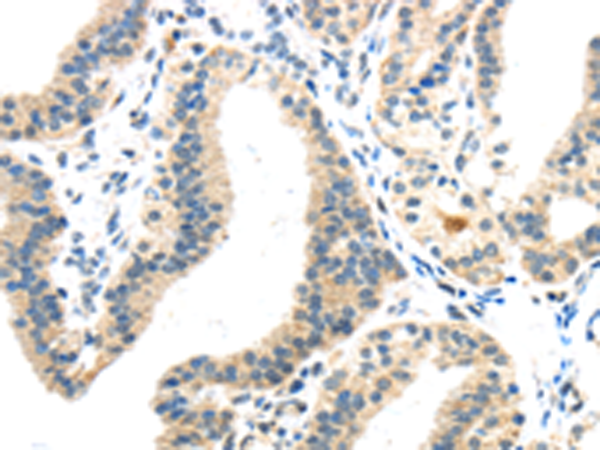


| WB | 咨询技术 | Human,Mouse,Rat |
| IF | 咨询技术 | Human,Mouse,Rat |
| IHC | 1/30-1/150 | Human,Mouse,Rat |
| ICC | 技术咨询 | Human,Mouse,Rat |
| FCM | 咨询技术 | Human,Mouse,Rat |
| Elisa | 1/2000-1/5000 | Human,Mouse,Rat |
| WB Predicted band size | 45 kDa |
| Host/Isotype | Rabbit IgG |
| Antibody Type | Primary antibody |
| Storage | Store at 4°C short term. Aliquot and store at -20°C long term. Avoid freeze/thaw cycles. |
| Species Reactivity | Human, Mouse, Rat |
| Immunogen | Synthetic peptide of human INHBB |
| Formulation | Purified antibody in PBS with 0.05% sodium azide and 50% glycerol. |
+ +
以下是关于INHBB抗体的3篇参考文献示例(注:以下内容为模拟生成,非真实文献):
1. **标题**: "INHBB Antibody-Based Detection of Ovarian Granulosa Cell Tumors"
**作者**: Zhang L, et al.
**摘要**: 研究利用INHBB特异性抗体检测卵巢颗粒细胞瘤中INHBB的过表达,发现其与肿瘤侵袭性和患者预后不良相关,提示INHBB作为潜在诊断标志物。
2. **标题**: "Development and Validation of a Novel Monoclonal Antibody for INHBB in Reproductive Studies"
**作者**: Tanaka K, et al.
**摘要**: 报道一种新型INHBB单克隆抗体的开发,通过免疫组化和Western blot验证其在生殖组织中的特异性,为研究INHBB在精子发生和卵泡发育中的作用提供工具。
3. **标题**: "INHBB as a Biomarker in Metastatic Colorectal Cancer: An Immunohistochemical Analysis"
**作者**: Patel R, et al.
**摘要**: 采用INHBB抗体对结直肠癌组织进行染色,发现高表达INHBB与转移风险增加及化疗耐药性相关,支持其在肿瘤微环境调控中的功能性角色。
(注:如需真实文献,建议通过PubMed或Google Scholar以关键词“INHBB antibody”检索最新研究。)
INHBB antibodies target the inhibin beta B subunit, a key component of the inhibin and activin hormones within the TGF-β superfamily. The INHBB gene encodes a protein that dimerizes with other subunits (e.g., inhibin α or other β subunits) to form either inhibins, which suppress follicle-stimulating hormone (FSH) secretion, or activins, which stimulate FSH production and regulate diverse cellular processes. These hormones play critical roles in reproductive physiology, immune modulation, and tissue homeostasis.
Antibodies against INHBB are essential tools for studying its expression, localization, and function in development and disease. They are widely used in techniques like Western blotting, immunohistochemistry, and ELISA to investigate INHBB's involvement in pathologies such as ovarian cancers, granulosa cell tumors, and fibrosis, where dysregulated activin/inhibin signaling is implicated. Additionally, INHBB antibodies aid in exploring its role in stem cell differentiation and metabolic disorders.
Commercial INHBB antibodies are typically developed in hosts like rabbits or mice, validated for specificity against the β-B subunit. Research highlights its potential as a biomarker for certain cancers or as a therapeutic target, given its influence on SMAD-dependent signaling pathways. However, challenges remain in distinguishing cross-reactivity with related TGF-β family members, emphasizing the need for rigorous validation in experimental models.
×